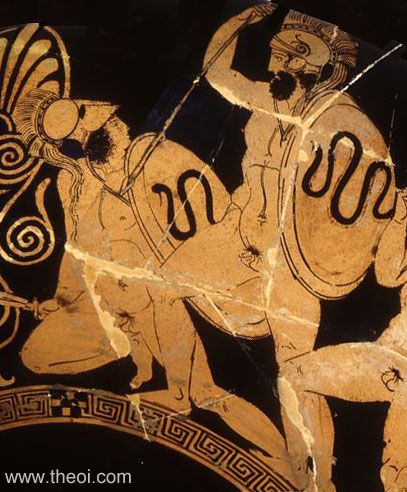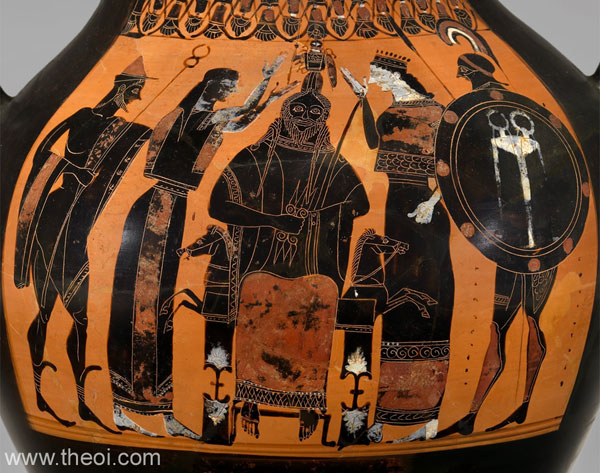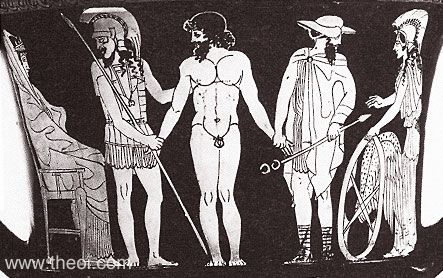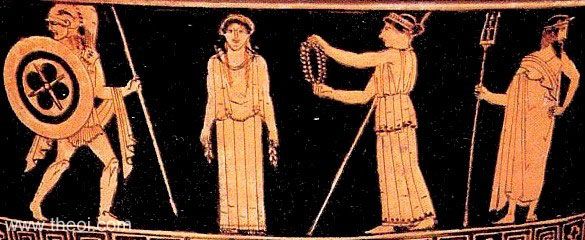ARES MYTHS 1
Greek Name
Αρης
Transliteration
Arês
Latin Spelling
Ares
Translation
Mars

ARES was the Olympian god of war, battlelust and manliness.
This page presents general myths featuring the god including his birth, role in the Titan and Giant Wars, capture by the Aloadai twins, and conflicts with the hero Herakles.
CLASSICAL LITERATURE QUOTES
BIRTH & YOUTH OF ARES
Hesiod, Theogony 921 ff (trans. Evelyn-White) (Greek epic C8th or 7th B.C.)
:
"Zeus took Hera to be his fresh consort, and she, lying in the arms of the father of gods and mortals,
conceived and bore Hebe to him, and Ares, and Eileithyia."
Aeschylus, Fragment 282 (from Papyri Oxyrhynchus) (trans. Lloyd-Jones) :
"[Dike the goddess of justice speaks : ] Much would they gain, should they receive me kindly . . ((two line
lacuna)) no city of people or private man, since such is the god-sent fortune she enjoys. And I will tell you a
proof which gives you this clearly. Hera has reared a violent son [Ares] whom she has borne to Zeus, a god
irascible, hard to govern, an one whose mind knew no respect for others. He shot wayfarers with deadly arrows,
and ruthless hacked . . ((lacuna)) with hooked spears . . he rejoiced and laughed . . evil . . scent of
blood."
Pseudo-Apollodorus, Bibliotheca 1. 13 (trans. Aldrich) (Greek mythographer C2nd A.D.)
:
"Zeus married Hera and fathered Hebe, Eileithyia, and Ares."
Pausanias, Description of Greece 2. 14. 3 (trans. Jones) (Greek travelogue C2nd A.D.)
:
"Olen, in his hymn to Hera, says that Hera's . . . children were Ares and Hebe."
Pausanias, Description of Greece 3. 19. 7 :
"A road from the city [of Sparta] leads [across the River Eurotas] to Therapne . . . Of all the objects
along this road the oldest is a sanctuary of Ares . . . They surname him Theritas (the Beastly One) after Thero,
who is said to have been the nurse of Ares. Perhaps it was from the Kolkhians that they heard the name Theritas,
since the Greeks know of no Thero, nurse of Ares."
Pseudo-Hyginus, Preface (trans. Grant) (Roman mythographer C2nd A.D.) :
"From Jove [Zeus] and Juno [Hera] [was born] Mars [Ares]."
Ovid, Fasti 5. 229 ff (trans.Boyle) (Roman poetry C1st B.C. to C1st A.D.)
:
"[Flora tells the story of the birth of Mars-Ares :] Mars [Ares] also, you may not know, was formed by my
[Flora's] arts. I pray that Jove [Zeus] stays ignorant of this. Holy Juno [Hera], when Minerva [Athene] sprang
unmothered, was hurt that Jove did not need her service. She went to complain to Oceanus of her husband's deeds.
She stopped at our door, tired from the journey. As soon as I saw her, I asked, ‘What's brought you here,
Saturnia [Hera]?’ She reports where she's going, and cites the cause. I consoled her with friendly words :
‘Words,’ she declares, ‘cannot relieve my pain. If Jove became a father without using a spouse
and possesses both titles by himself, why should I not expect a spouseless motherhood, chaste parturition,
untouched by a man? I'll try every drug on the broad earth and empty Oceanus and the hollows of
Tartarus.’
Her speech was mid-course; my face was hesitant. ‘You look, Nympha, as thou you can help,’ she says.
Three times I wanted to help, three times my tongue stuck : Jupiter's anger caused massive fear. ‘Please
help me,’ she said, ‘my source will be concealed;’ and the divine Styx testifies to this.
‘A flower,’ I said, ‘from the fields of Olenus [in the Peloponnesos] will grant your wish.
It's unique to my gardens. I was told : "Touch a barren cow; she'll be a mother." I touched. No delay
: she was a mother.’
I quickly plucked the clinging flower with my thumb. Juno feels its touch and at the touch conceives. She
bulges, and enters Thrace and west Propontis, and fulfils her wish : Mars [Ares] was created. Recalling my role
in his birth, Mars said : ‘You, too, should have a place in Romulus' city.’"
[N.B. The fact that Ovid mentions the Greek city of Olenos in this myth, strongly suggests it was derived it
from a Greek source.]
Statius, Thebaid 4. 786 ff (trans. Mozley) (Roman epic C1st A.D.) :
"The child, lying in the bosom of the vernal earth and deep in herbage, now crawls forward on his face and
crushes the soft grasses, no in clamorous thrist for milk cries for his beloved nurse . . . Such was the young
Mars [Ares] amid Odrysian snow."
[N.B. Odrysia is in Thrake, the favourite land of the god.]
ARES, THE WAR OF THE TITANS & THE GIANT ECHIDNADES

Nonnus, Dionysiaca 18. 274 ff (trans. Rouse) (Greek epic C5th A.D.) :
"[Ares] brought low such another [giant], Ekhidna's son, the gods' enemy, spitting the horrible poison of
hideous Ekhidna [the serpent-Nymphe]. He had two shapes together, and in the forest he shook the twisting coils
of his mother's spine. Kronos used this huge creature to confront the thunderbolt [of Zeus], hissing war with
the snaky soles of his feet; when he realised his hands above the circle of the breast and fought against your
Zeus, and lifting his high head, covered it with masses of cloud in the paths of the sky. Then if the birds came
wandering into his tangled hair, he often swept them together into his capacious throat for a dinner. This
masterpiece your brother Ares killed."
Nonnus, Dionysiaca 20. 35 ff :
"Ares, destroyer of the Titanes, his father's champion, who lifts a proud neck in heaven, still holding
that shield ever soaked with gore."
For MORE information on this giant see EKHIDNADES
ARES & THE WAR OF THE GIANTS
Ares fought with the other gods in a War against the Gigantes (serpent-footed giants), and slew the Gigante Mimas. In ancient Greek vase painting the Gigante opponent of Ares is named Mimon.
Apollonius Rhodius, Argonautica 3. 1227 ff (trans. Rieu) (Greek epic C3rd B.C.)
:
"Aeetes [King of Kolkhis] put on his breast the stiff cuirass which Ares had given him after slaying Mimas
with his own hands in the field of Phlegra."
For MORE information on the War of the Giants see GIGANTES
ARES & THE GIANT TYPHOEUS
Antoninus Liberalis, Metamorphoses 28 (trans. Celoria) (Greek mythographer C2nd A.D.)
:
"Typhon felt an urge to usurp the rule of Zeus and not one of the gods could withstand him as he attacked
[Olympos]. In panic they fled to Aigyptos (Egypt), all except Athena and Zeus, who alone were left. Typhon
hunted after them, on their track. When they fled they had changed themselves in anticipation into animal forms.
Apollon became a hawk [Horus], Hermes an ibis [Thoth], Ares became a fish, the lepidotus [i.e. the Egyptian god
Onuris whose sacred fish was the lepidotus]."
For MORE information on this giant see TYPHOEUS
ARES & THE ALOADAE GIANTS
Homer, Iliad 5. 385 ff (trans. Lattimore) (Greek epic C8th B.C.) :
"[Zeus speaks :] ‘Many of us who have our homes on Olympos endure things from men, when ourselves we
inflict hard pain on each other. Ares had to endure it when strong Ephialtes and Otos, sons of Aloeus, chained
him in bonds that were too strong for him, and three months and ten he lay chained in the brazen cauldron; had
not Eeriboia, their stepmother, the surpassingly lovely, brought word to Hermes, who stole Ares away out of it,
as he was growing faint and the hard bondage was breaking him.’"
Pseudo-Apollodorus, Bibliotheca 1. 54 (trans. Aldrich) (Greek mythographer C2nd A.D.)
:
"They [the Aloadai giants] decided to fight the gods. So they set Mount Ossa on top of Mount Olympos, and
then placed Mount Pelion on top of Ossa, threatening by means of these mountains to climb up to the sky . . .
And they also bound up Ares. But Hermes secretly snatched Ares away."
Pseudo-Hyginus, Astronomica 2. 40 (trans. Grant) (Roman mythographer C2nd A.D.)
:
"[Constellation Krater, the Bowl.] Others [it is] the jar into which Mars [Ares] was thrown by Otus and
Ephialtes."
Nonnus, Dionysiaca 31. 41 ff (trans. Rouse) (Greek epic C5th A.D.) :
"Ares . . . was shackled tight inglorious in earthly fetters in a jar, where Ephialtes had hidden him. Nor
did heavenly Zeus help him."
For MORE information on these giants see ALOADAI
ARES & THE CRIMINAL SISYPHUS

Aeschylus, Sisyphus the Runaway (lost play) (Greek tragedy C5th B.C.) :
Weir Smyth (L.C.L.) quotes Pherecydes, a C5th B.C. mythographer, in his discussion of the plot of this lost play
: "The drama was satyric; its theme, the escape from Haides of the crafty Korinthian king. According to the
fabulous story told by Pherekydes (Frag. 78 in Müller, Fragmenta Historicum Graecorum) Sisyphos
made known to Asopos that it was Zeus who had carried off his daughter Aigina; in punishment for which offence
the god sent Thanatos (Death) against the babbler; but Sisyphos bound Thanatos (Death) fast, so that men ceased
to die, until Ares came to the rescue, released Thanatos, and gave Sisyphos into his power."
ARES, HEPHAESTUS & THE BINDING OF HERA
After his birth, Hera cast the cripled Hephaistos from heaven in disgust. When he grew up, he sent gifts to
Olympos, including a golden throne for Hera. But when the goddess sat upon it she was bound fast. Hera offered
the hand of Aphrodite in marriage to the god who could release her. Ares attempted to bring him Hephaistos back
to Olympos by force, but was driven back by a flaming volley of metal shards. Dionysos later suggested that
Hephaistos return willingly and claim the prize of Aphrodite for himself.
Neither Ares nor Aphrodite were pleased with this outcome, and were forced to engage in their famous adulterous
affair.
Suidas s.v. Deimos (trans. Suda On Line) (Byzantine Greek lexicon C10th A.D.)
:
"Deimos (Fear) and Phobos (Fright) and Kydoimos (Din of War), attendants of Ares, the sons of war; they too
experienced what Ares did, after Hephaistos had not been frightened by them."
For the MYTH of Aphrodite and Ares see Ares Loves: Aphrodite
ARES CHALLENGES APOLLO AT THE OLYMPIC GAMES
Herodotus, Histories 5. 7. 10 (trans. Godley) (Greek historian C5th B.C.)
:
"He [Zeus] held the games in honor of his victory over Kronos. The record of victors include Apollon, who
outran Hermes and beat Ares at boxing."
Pausanias, Description of Greece 5. 7. 10 (trans. Jones) (Greek travelogue C2nd A.D.)
:
"[At the very first Olympic Games :] Some say that Zeus wrestled here [i.e. at Olympia] with Kronos himself
for the throne, while others say that he held the games in honor of his victory over Kronos. The record of
victors include Apollon, who outran Hermes and beat Ares at boxing."
ARES & THE FEASTS OF THE GODS
Homeric Hymn3 to Pythian Apollo 190 ff (trans. Evelyn-White) (Greek epic C7th to 4th
B.C.) :
"[At the feast of the gods on Mount Olympos :] All the Mousai (Muses) together, voice sweetly answering
voice, hymn the unending gifts the gods enjoy . . . The rich-tressed Kharites (Graces) and cheerful Horai
(Seasons) dance with Harmonia and Hebe and Aphrodite . . . And among them sings . . . Artemis . . . Among them
sports Ares and keen-eyed Argeiphontes [Hermes], while Apollon plays his lyre."
Valerius Flaccus, Argonautica 2. 414 ff (trans. Mozley) (Roman epic C1st A.D.)
:
"[Ganymedes cupbearer of the gods] was standing joyfully at the table in heaven, nay, even Jove's [Zeus']
armourbearer himself [Ares] quaffs the beguiling draught from the Phrygian's ministering hand."
Colluthus, Rape of Helen 14 ff (trans. Mair) (Greek poetry C5th to 6th A.D.)
:
"[The wedding-feast of Peleus and Thetis was attended by the gods :] At the bidding of Zeus, Ganymede
poured the wine. And all the race of gods hasted to do honour to the white-armed bride [Thetis], own sister of
Amphitrite: Zeus from Olympos and Poseidon from the sea . . . And iron Ares, even as, helmetless nor lifting
warlike spear, he comes into the house of Hephaistos, in such wise without breastplate and without whetted sword
danced smilingly [at the wedding]."
ARES & THE TRAVAILS OF LETO
Hera commanded Ares to force the lands of Greece to reject the pregnant Leto in her wanderings, driving her from land to land her search for a place to give birth to the twins Apollon and Leto.
Callimachus, Hymn 4 to Delos 51 ff (trans. Mair) (Greek poet C3rd B.C.) :
"Hera murmured terrible against all child-bearing women that bare children to Zeus, but especially against
Leto, for that she only was to bear to Zeus a son dearer even than Ares. Wherefore also she herself kept watch
within the sky, angered in her heart greatly and beyond telling, and she prevented Leto who was holden in the
pangs of child-birth. And she had two look-outs to keep watch upon the earth. The space of the continents did
bold Ares watch, sitting armed on the high top of Thrakian Haimos, and his horses were stalled by the
seven-chambered cave of Boreas. And the other kept watch over the far-flung islands, even Thaumantia [Iris]
seated on Mimas, whither she had sped. There they sat and threatened all the cities which Leto approached and
prevented them from receiving her . . .
[She then fled to the river Peneios in Thessalia seeking refuge.] Peneios answered her : ‘Hera hath
largely threatened me. Behold what manner of watcher keeps vigil on the mountain top, who would lightly drag me
forth from the depths . . . I will endure for thy sake . . . Here am I! What needeth more? Do thou but call upon
Eileithyia.’
He spake and stayed his great stream. But Ares was about to lift the peaks of Pangaion [in western Thrake] from
their base and hurl them in his eddying waters and hide his streams. And from on high he made a din as of
thunder and smote his shield with the point of his spear, and it rang with a warlike noise. And the hills of
Ossa trembled and the plain of Krannon, and the windswept skirts of Pindos, and all Thessalia danced for fear:
such echoing din rang from his shield. And even as when the mount Aitna smoulders with fire and all its secret
depths are shaken as the giant under earth, even Briares, shifts to his other shoulder, and with the tongs of
Hephaistos roar furnaces and handiwork withal; and firewrought basins and tripods ring terribly as the fall one
upon the other: such in that hour was the rattle of the fair-rounded shield. But Peneios retired not back, but
abode his ground, steadfast even as before, and stayed his swift-eddying streams, until the daughter of Koios
[Leto] called to him : ‘Save thyself, farewell! Save thyself; do not for my sake suffer evil for this thy
compassion; thy favour shall be rewarded.’"
For MORE information on this goddess see LETO

ARES & THE ADVENTURES OF HERACLES
Ares and his mortal half-brother Herakles were repeatedly engaged in conflict.
I. HERAKLES SLAYS THE CHILDREN OF ARES
Two of the twelve labours of Herakles involved the children of Ares: one was to fetch the man-eating mares of King Diomedes of Bistonia in Thrake, the other was to fetch the belt of the Amazon Queen Antiope. He slew both in the course of completing his errands.
II. HERAKLES WOUNDS ARES IN THE WAR OF PYLOS
Hesiod, Shield of Herakles 357 ff (trans. Evelyn-White) (Greek epic C8th or 7th B.C.)
:
"[Herakles addresses Kyknos, the son of Ares :] ‘Even before now, I claim, he [Ares] has at one time
had experience of my spear, upon that time when, above sandy Pylos, he stood up against me, raging hard in fury
for battle, and three times, under the stabling of my spear on his shield, he was knocked down upon the ground,
and the fourth time, I thrust with all my rage at his thigh and split a great hole in his his body, and headlong
into the dust he tumbled then, under my spearing. And there he might have been disgraced among the gods, if he
had gone down under my hands and left the bloody spoils to me.’"
III. ARES SUPPORTS HIS SON KYKNOS IN A FIGHT WITH HERAKLES
For the MYTH of Ares, Kyknos and Herakles see Ares Favour: Kyknos
IV. ARES SUPPORTS AKHELOIOS IN A FIGHT WITH HERAKLES
Pausanias, Description of Greece 6. 19. 12 (trans. Jones) (Greek travelogue C2nd
A.D.) :
"The Megarians . . . built a treasury [at Olympia] and dedicated in it offerings, small cedar-wood figures
inlaid with gold, representing the fight of Herakles with [the river-god] Akheloios. The figures include Zeus,
Deianeira, Akheloios, Herakles, and Ares helping Akheloios."
For MORE information on this river-god see AKHELOIOS
ARES OFFERED HUMAN SACRIFICES (IN MYTH)
I. THE THEBANS SACRIFICE A YOUTH TO ARES
During the War of the Seven Against Thebes, Menoikeus, one of the Spartoi, local descendants of the god Ares, sacrificed himself to the god to secure the city against conquest.
Pseudo-Apollodorus, Bibliotheca 3. 73 (trans. Aldrich) (Greek mythographer C2nd A.D.)
:
"[At the onset of the War of the Seven Against Thebes:] When the Thebans consulted Teiresias, he told them
that they would win the battle if Kreon's son Menoikeus [one of the Spartoi] were to offer himself as a victim
to Ares. When he heard this, Menoikeus took his life in front of the gates."
Pseudo-Hyginus, Fabulae 67 (trans. Grant) (Roman mythographer C2nd A.D.) :
"Oedipus received his father's kingdom, and Jocasta his mother as wife, unwittingly, and begat on her [four
children] . . . Meanwhile barrenness of crops and want fell on Thebes because of the crimes of Oedipus, and
Tiresias, questioned as to why Thebes was so harassed, replied that if anyone from the Dracon's blood [i.e. the
Spartoi] survived and died for his country, he would free Thebes from the plague. Then Menoeceus threw himself
from the walls."
Pseudo-Hyginus, Fabulae 68 :
"When the others [i.e. the army of the Seven Against Thebes] were attacking Thebes, and the Thebans were
despairing of their royal family, Tiresias, son of Everes, a prophet, foretold hat if anyone of the Dracon's
descendants [the Spartoi] should perish, the town would be freed from that disaster. Menoeceus, realizing that
he alone of the citizens could bring safety, threw himself from the wall; the Thebans won the victory."
For MORE information on the Spartoi clan see SPARTOI
II. LYKOS SACRIFICES STRANGERS TO ARES
Pseudo-Plutarch, Greek and Roman Parallel Stories 23 (trans. Babbitt) (Greek
historian C2nd A.D.) :
"After the sack of Troy Diomedes was cast upon on the Libyan coast where Lykos was king, whose custom it
was to sacrifice strangers to his father Ares . . . So says Juba in the third book of his Libyan
History."
III. KYKNOS SACRIFICES STRANGERS TO ARES & PHOBOS
Stesichorus, Fragment 207 (from Scholiast on Pindar) (trans. Campbell, Vol. Greek
Lyric III) (C7th to 6th B.C.) :
"Kyknos, son of Ares, lived in the pass of Thessalia and beheaded strangers who came along in order to
build a temple to Phobos (Panic) [son of Ares] from the skulls."
For the MYTH of Ares, Kyknos and Herakles see Ares Family Favour: Cycnus
IV. OINOMAOS SLAYS SUITORS (perhaps as offerings to his father Ares)
For the MYTH of Aeetes sacrifices to Ares see Ares Family Favour: Oenomaus
V. AEETES SACRIFICES STRANGERS TO ARES AND PHOBOS
For the MYTH of Aeetes sacrifices to Ares see Ares Favour: Aeetes
ARES & THE INDIAN WAR OF DIONYSUS
The god Dionysos led his armies in battle against the Kingdom of the Indians. Hera despatched Ares to support the Indians in the struggle, for she was still full of wrath for Dionysos.
The story is told in the Dionysiaca of Nonnus (not currently quoted here).
SOURCES
GREEK
- Homer, The Iliad - Greek Epic C8th B.C.
- Hesiod, Theogony - Greek Epic C8th - 7th B.C.
- Hesiod, The Shield of Heracles - Greek Epic C8th - 7th B.C.
- The Homeric Hymns - Greek Epic C8th - 4th B.C.
- Greek Lyric III Stesichorus, Fragments - Greek Lyric C7th - 6th B.C.
- Aeschylus, Fragments - Greek Tragedy C5th B.C.
- Herodotus, Histories - Greek History C5th B.C.
- Apollonius Rhodius, The Argonautica - Greek Epic C3rd B.C.
- Callimachus, Hymns - Greek Poetry C3rd B.C.
- Pausanias, Description of Greece - Greek Travelogue C2nd A.D.
- Plutarch, Parallel Stories - Greek Historian C1st - 2nd A.D.
- Antoninus Liberalis, Metamorphoses - Greek Mythography C2nd A.D.
- Nonnus, Dionysiaca - Greek Epic C5th A.D.
ROMAN
- Hyginus, Fabulae - Latin Mythography C2nd A.D.
- Hyginus, Astronomica - Latin Mythography C2nd A.D.
- Ovid, Fasti - Latin Poetry C1st B.C. - C1st A.D.
- Valerius Flaccus, The Argonautica - Latin Epic C1st A.D.
- Statius, Thebaid - Latin Epic C1st A.D.
BYZANTINE
- Suidas, The Suda - Byzantine Greek Lexicon C10th A.D.
BIBLIOGRAPHY
A complete bibliography of the translations quoted on this page.